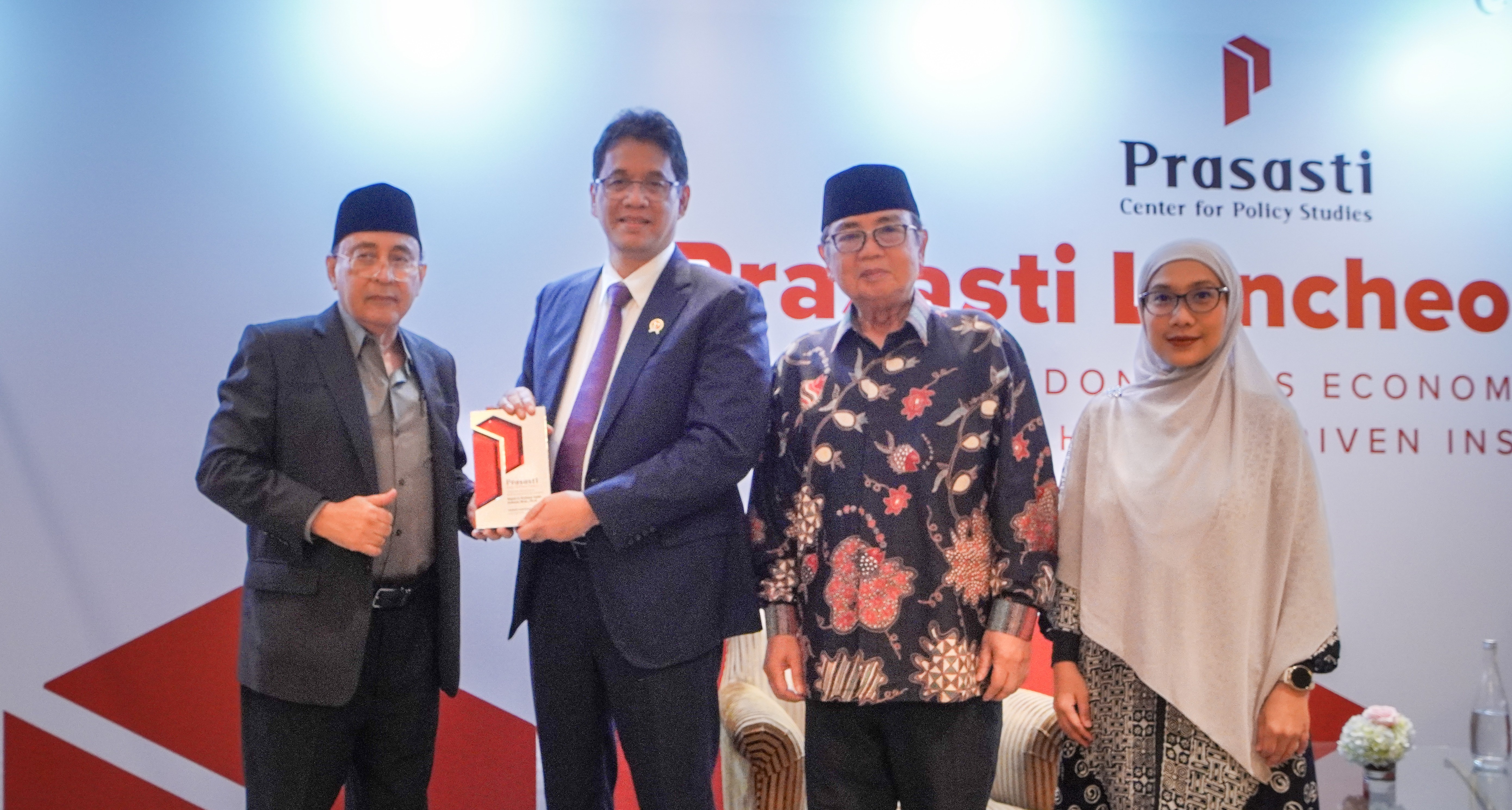Jakarta, October 9, 2025 — The Prasasti Center for Policy Studies, a think tank focused on economic development and public policy, held a closed discussion as part of the Prasasti Luncheon Talk featuring Indonesia’s Minister of Finance, Purbaya Yudhi Sadewa. The event, which took place on Wednesday (Oct 8), was attended by business leaders and members of Prasasti. During the session, Minister Purbaya presented the Ministry of Finance’s strategic plans and opened a question-and-answer discussion with Prasasti members.
Prasasti Board of Advisors member Burhanuddin Abdullah noted that this inaugural Prasasti Luncheon Talk came at the right moment. “In the near future, on October 20 to be exact, President Prabowo Subianto’s administration will mark its first year. During this period, we have witnessed various reform efforts in food security, energy, fiscal management, macroeconomic stability, and more — all amid the challenges of a difficult global economy,” he said.
Prasasti Executive Director Nila Marita also emphasized the importance of dialogue in public policy formulation. “Prasasti believes that good public policy can only emerge from a dialogue-based process that is data-driven, open to constructive criticism, and carried out with integrity. The business community, academia, and civil society must all be part of this process to ensure that policy transformation remains sustainable and effective,” she added.

During the Prasasti Luncheon Talk, Minister of Finance Purbaya Yudhi Sadewa presented a case study on how Asian countries have transitioned into developed nations. He highlighted that advanced economies such as Korea, Taiwan, and China sustained double-digit economic growth for more than a decade before achieving significant progress.
“When it comes to growth strategy, achieving 8% economic growth is already challenging — but that’s the target we must aim for if we want to become a developed country. Nations like Japan, Korea, Taiwan, and China consistently targeted double-digit growth for over ten years before they became developed. If we stay stagnated at 5%, it will be difficult to advance,” he stated.
From these Asian success stories, Purbaya emphasized that the key to rapid growth lies in economic transformation — particularly by strengthening the manufacturing sector. “The core idea is to transform the economy. Several countries shifted from being agriculture-based to manufacturing-based, and then to service-based economies. Countries like China, South Korea, and Germany have consistently maintained strong manufacturing bases,” he explained.
Purbaya stressed that while the agricultural sector must continue to be protected, efforts toward manufacturing transformation — especially in high-tech industries — cannot stop. “All programs designed to accelerate the shift towards a manufacturing-based economy, particularly in high-technology manufacturing, are strategic priorities that we must pursue seriously,” he affirmed.
To accelerate growth toward the 8% target, the government’s main strategy is to ensure that the private sector acts as the primary driver of growth, with the state budget (APBN) serving as a catalyst. The approach focuses on high value-added and high-multiplier sectors, as well as revitalizing labor-intensive industries through expanded budget allocations. “The private sector must be the main engine of growth. The government’s role is to create a conducive business environment, improve regulations, and expedite budget realization and ministry spending. We have started this by forming an economic acceleration task force to resolve investment bottlenecks,” he said.
Purbaya also identified Foreign Direct Investment (FDI) as a vital component. He explained that Singapore succeeded by creating a pro-FDI investment climate and transitioning to high value-added sectors, South Korea advanced through state-led industrialization, and Vietnam accelerated its development through global trade integration and FDI-driven manufacturing. Learning from these examples, he emphasized that he is committed to ensuring a favorable investment environment.
“I have experience dealing with investment barriers since 2016–2019. At that time, there were 193 bottleneck cases worth IDR 893 trillion. With the same approach, I’m confident we can further improve the investment climate,” he said confidently.
Purbaya expressed optimism that if the two growth engines — the government (fiscal policy) and the private sector — can operate synergistically, higher growth targets can be achieved. “For the past twenty years, we’ve been running on one weak engine. Moving forward, we will activate both. If both engines work together, achieving growth of 6 to 6.5 percent over the next year should not be too difficult,” he said optimistically.
The Prasasti Luncheon Talk concluded with high engagement from business and policy leaders, highlighting a shared commitment to open dialogue and strategic collaboration for Indonesia’s sustainable economic transformation.(*)
